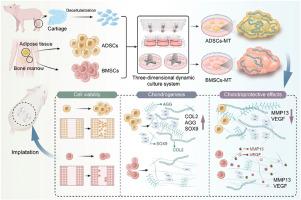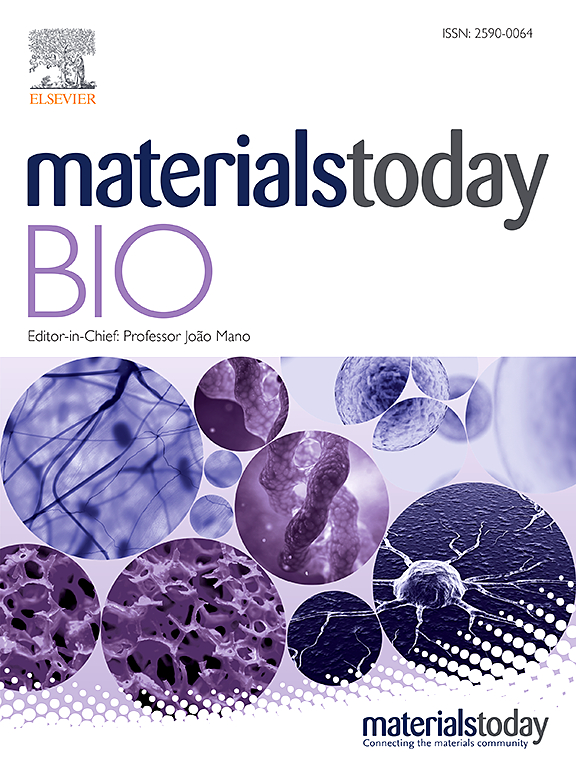High paracrine activity of hADSCs cartilage microtissues inhibits extracellular matrix degradation and promotes cartilage regeneration
IF 8.7
1区 医学
Q1 ENGINEERING, BIOMEDICAL
引用次数: 0
Abstract
Due to its unique structure, articular cartilage has limited self-repair capacity. Microtissues are tiny tissue clusters that can mimic the function of target organs or tissues. Using cells alone for microtissue construction often results in the formation of necrotic cores. However, the extracellular matrix (ECM) of native cartilage can provide structural support and is an ideal source of microcarriers. Autologous adipose-derived mesenchymal stem cells (ADSCs) and bone marrow mesenchymal stem cells (BMSCs) are widely used in cartilage tissue engineering. In this study, we fabricated microcarriers and compared the behavior of two homologous cell types in the microcarrier environment. The microcarrier environment highlighted the advantages of ADSCs and promoted the proliferation and migration of these cells. Then, ADSCs microtissues (ADSCs-MT) and BMSCs microtissues (BMSCs-MT) were fabricated using a three-dimensional dynamic culture system. In vitro and in vivo experiments verified that the cartilage regeneration ability of ADSCs-MT was significantly superior to that of BMSCs-MT. Transcriptomics revealed that ADSCs-MT showed significantly lower expression levels of ECM degradation, osteogenesis, and fibrocartilage markers. Finally, the protective effect of microtissues on inflammatory chondrocytes was validated. Overall, the ADSCs-MT constructed in this study achieved excellent cartilage regeneration and could be promising for the autologous application of cartilage microtissues.


高旁分泌活性的hascs软骨微组织抑制细胞外基质降解,促进软骨再生
由于其独特的结构,关节软骨的自我修复能力有限。微组织是可以模仿目标器官或组织功能的微小组织簇。单独使用细胞进行微组织构建通常会导致坏死核心的形成。然而,天然软骨的细胞外基质(ECM)可以提供结构支持,是微载体的理想来源。自体脂肪源性间充质干细胞(ADSCs)和骨髓间充质干细胞(BMSCs)在软骨组织工程中有着广泛的应用。在本研究中,我们制备了微载体,并比较了两种同源细胞类型在微载体环境中的行为。微载体环境突出了ADSCs的优势,促进了ADSCs的增殖和迁移。然后利用三维动态培养系统制备ADSCs微组织(ADSCs- mt)和BMSCs微组织(BMSCs- mt)。体外和体内实验证实ADSCs-MT的软骨再生能力明显优于BMSCs-MT。转录组学显示,ADSCs-MT的ECM降解、成骨和纤维软骨标志物的表达水平显著降低。最后,验证了微组织对炎性软骨细胞的保护作用。综上所述,本研究构建的ADSCs-MT具有良好的软骨再生效果,在软骨显微组织的自体应用方面具有广阔的前景。
本文章由计算机程序翻译,如有差异,请以英文原文为准。
求助全文
约1分钟内获得全文
求助全文
来源期刊

Materials Today Bio
Multiple-
CiteScore
8.30
自引率
4.90%
发文量
303
审稿时长
30 days
期刊介绍:
Materials Today Bio is a multidisciplinary journal that specializes in the intersection between biology and materials science, chemistry, physics, engineering, and medicine. It covers various aspects such as the design and assembly of new structures, their interaction with biological systems, functionalization, bioimaging, therapies, and diagnostics in healthcare. The journal aims to showcase the most significant advancements and discoveries in this field. As part of the Materials Today family, Materials Today Bio provides rigorous peer review, quick decision-making, and high visibility for authors. It is indexed in Scopus, PubMed Central, Emerging Sources, Citation Index (ESCI), and Directory of Open Access Journals (DOAJ).
文献相关原料
公司名称
产品信息
索莱宝
Toluidine blue
索莱宝
crystal violet
索莱宝
Triton
索莱宝
glutaraldehyde
索莱宝
DAPI
索莱宝
hematoxylin and eosin (H&E)
索莱宝
crystal violet
索莱宝
2.5% glutaraldehyde
索莱宝
DAPI staining
 求助内容:
求助内容: 应助结果提醒方式:
应助结果提醒方式:


